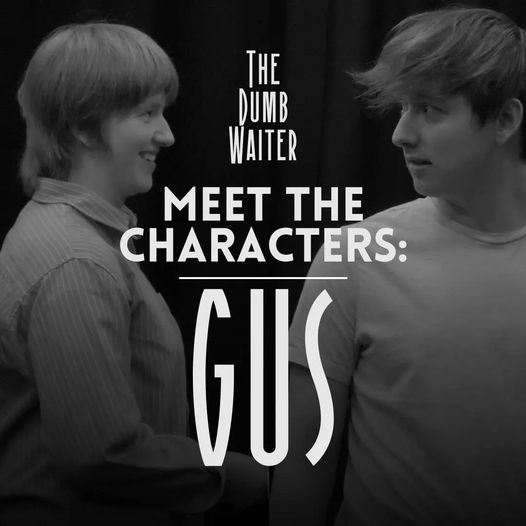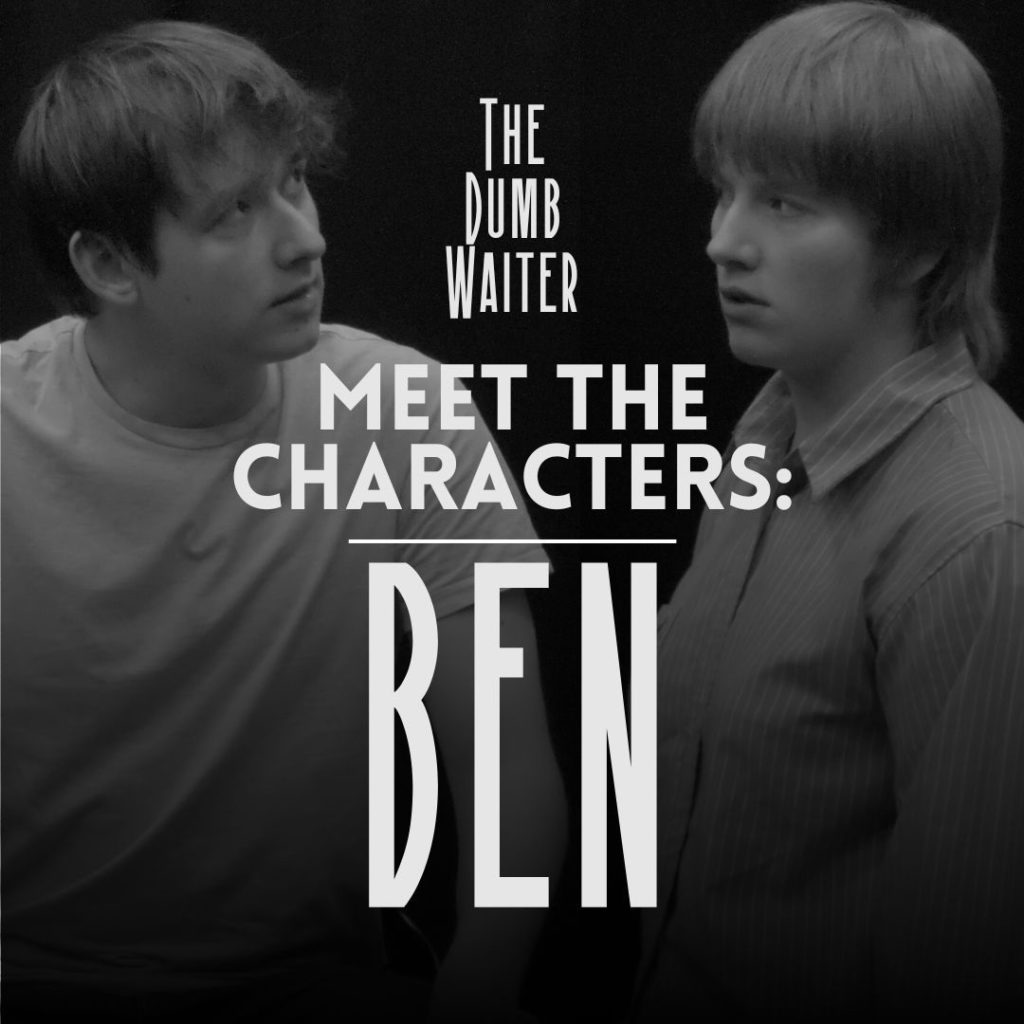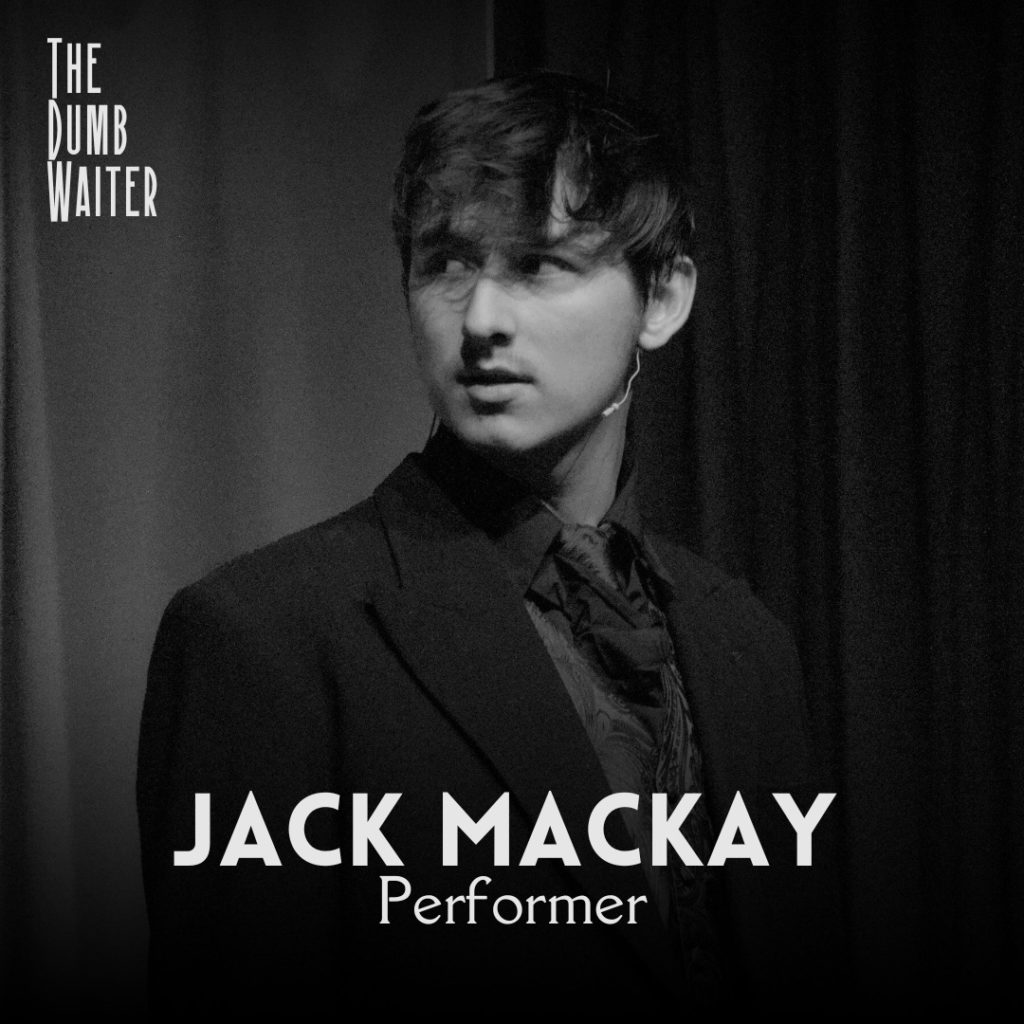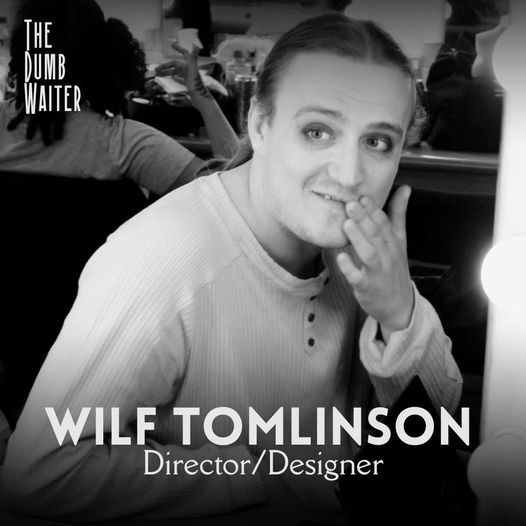
YORK company Griffonage Theatre follow up February’s production of Patrick Hamilton’s Rope with Harold Pinter’s 1957 one-act play The Dumb Waiter at Theatre@41, Monkgate, York, from Thursday to Saturday.
Two hitmen, Ben and Gus, are waiting in a basement room for their assignment, but why is a dumbwaiter in there, when the basement does not appear to be in a restaurant? To make matters worse, the loo won’t flush, the kettle won’t boil, and the two men are increasingly at odds with each other.
Unique to this madcap/macabre production, directed and designed by Wilf Tomlinson, actors Jack Mackay and Katie Leckey will alternate the roles of Ben and Gus at each performance.
Here, co-artistic directors Jack and Katie and fellow University of York student Wilf answer CharlesHutchPress’s questions collectively.
What attracted Griffonage Theatre to Harold Pinter’s The Dumb Waiter?
“Firstly, it’s a good play! Short and snappy! We were raring to get another show on in the summer, but Jack’s just finishing his third year and Katie and Wilf are finishing up an MA in Theatre-Making.
“Rope was a very long and involved process, so we were looking for something a little slimmer and lighter that we could perform while our schedules were so busy. We wanted to have the chance to really dive into something in detail and we felt like this play, being one of the most well-known two-handers ever, was worth a shot!
“Pinter is a giant of British theatre, and he’s part of the creative pantheon that we all love very dearly. Pinter, Beckett, Kafka, etc. – they’re our bread and butter. The phrase ‘comedy of menace’, which is very closely associated with Pinter, appealed very strongly to the kind of madcap/macabre fusion we’re trying to champion with Griffonage Theatre.
“Drawing out humour in darkness (and darkness in humour) wherever it can be found has always been part of our mission statement, so we thought one of his one-acts would be perfect. As it turns out, The Dumb Waiter might be shorter, but it’s definitely not light. We found that out quite quickly!
“Pinter is masterful with his tonal shifts: the play is hysterical one minute and really dark and gritty the next, just the way we at Griffonage like our plays. There’s humour, yes, but such a powerful sense of abstraction, confusion, and of course a very sinister element that creeps in slowly over the course of the play.
“And we’ll be switching roles every night, so the atmosphere shifts completely with every performance. We were definitely attracted to the idea of bringing something to life in a way that differs every time.
“The rehearsal process has been so rewarding in bringing that complexity to the surface. It’s been a delight to discover. Hopefully audiences experience the same kind of discovery as we did.”

Pinter has come back into favour. Why?
“We feel like there’s a kind of revolutionary cynicism in Pinter’s work that’s definitely appealing to modern audiences. In a wider political context, things have been quite scary recently and are still on dark paths in various parts of the world. Authoritarianism in particular looms large.
So much of Pinter’s writing is a critique – whether directly or obliquely – of unquestioned/unquestionable authority. You can certainly read The Dumb Waiter like that, though there’s a lot more going on in there, too.
“We’re a global, social, online society now, so audiences have never been more aware of those kinds of cultural trends. They’re looking for stories that express the frustration and anxiety that they feel day-to-day, but at the same time they’re also yearning for a bit of levity. Doom and gloom is all right, but if everything’s going to hell anyway, we should probably have a laugh while it does!
“Pinter speaks very strongly to that impulse. It’s the same reason we love Beckett so much.”
What are the strengths of a short play (one act, 55 minutes) as opposed to a longer one?
“In terms of the obvious, a shorter play means that a tighter turnaround on a busy schedule isn’t so frightening. Plus, you have time to unearth the depths of the text when you’re rehearsing a one-act play.
“There’s a lot of scholarship on Pinter, and we’ve luckily had time to square the wealth of critical writing about The Dumb Waiter with our own understanding of the play.
“In more creative terms, the strengths of a one-act lie in its conciseness. It’s commonly said that the measure of a good scene is in its efficiency: its ability to convey a lot of information and emotion in a short space of time. And, of course, 55 minutes is basically the perfect amount of time to build tension without it becoming gruelling. One act, no interval, no escape. It becomes a bit of a pressure cooker. The Dumb Waiter nails that for us.”
What does an early Pinter play say to a modern audience?
“This play in particular has a lot to say about how we distract ourselves from the realities of life with oversaturated guff. These two men are involved in some very shady and violent business, but they don’t ever discuss it. Instead, they just postulate and jabber.
“Not to read into it too much, but as people living in an age of distraction, we’re dealing with a lot of the same questions that Ben and Gus have. They’re very concerned with trivia, banter, cross-talk. There’s a powerful sense of avoidance – the fear of looking danger in the eye. And yet the more it’s avoided, the greater the fear becomes.

“Fast-talking comedies are in right now – just look at Succession – but it’s the underlying anxiety behind that fast-talking that really pushes the buttons of modern audiences. That same kind of dynamic is present in The Dumb Waiter especially. Why are we here? Why do we continue to do our jobs if we are unhappy or unsettled? Who really is upstairs?
“We are all seeking some sort of answer, but it’s all too easy to make a cuppa and chat about football or a sensationalised story the media are pushing at us rather than open that can of worms. But of course, it could mean nothing at all.
“If you could ask him, Pinter would say you have to watch the play yourself and find out what it means for you individually. We’ve taken that approach as actors/directors, interpreting it our own way, and I hope we can lead the audience to do that as well.”
On a theatrical history note, The Dumb Waiter was written in 1957 but not premiered until 1960, after both The Room and The Birthday Party. How do the plays compare?
“The Dumb Waiter is quite an unconventional play. It forms a loose trifecta with The Room and The Birthday Party, but both of those plays have coming-and-going – the injection of strangers into a familiar space. That’s the source of the menace, and along the way there’s a lot of playing with the typical comedy-of-manners scenario.
“The Dumb Waiter is not like that. It’s pure claustrophobia. It’s two men in a high-pressure environment with no option of leaving. There’s a growing and pervading sense of entrapment. Any external figures are kept deliberately shadowy, ambiguous, almost eldritch in nature.
“We’ve drawn a lot of similarities between it and Beckett’s Waiting For Godot, which is much more famously idiosyncratic, but there’s much to compare. Two men, waiting alone for someone to arrive.
“You could say it’s like Godot in a box. Perhaps that was a little harder to market than something more knowingly subversive like The Birthday Party. But it’s forged its own place as one of Pinter’s finest, if not his magnum opus.”
What is the symbolism of the dumbwaiter [a small freight elevator or lift to carry food] in The Dumb Waiter?
“We don’t want to give too much away for anyone who hasn’t yet seen it, but suffice to say that the play keeps things very ambiguous. We’ve been treating the dumbwaiter almost like a character of its own (which is helped by the fact that a real person is operating it backstage).
“There’s a nice metatextual angle there – a hidden figure manipulating the events onstage. You could see it as a representation of faceless, arbitrary authority. Its ‘dumbness’ is definitely part of that – it seems to delight in creating confusion without explanation. In terms of what it actually represents, the possibilities are endless. We hope everyone will have their own kind of reaction to it.”
Where are the “angry young men” of British playwriting today, Jack?
“They’re out there! Don’t worry about that. But it’s no secret that theatre’s in a difficult place at the moment, and the main obstacle to young people is that it’s getting increasingly more difficult to bring shows to a wider audience.

“A lot of it relies on marketing, which relies on funding, and funding is hard to get. But we’ve worked a lot recently with local writers – a lot of them are students like ourselves, and there’s a great deal of fire and passion and a desire to understand our world and maybe even change it.
“Katie and I are strong believers in the necessity of art as a vehicle for that. And the York theatre scene is very welcoming to new talent. We have a lot of love for Theatre@41 for that reason. Very soon we’ll be making our own original work, and it’s our mission to help provide young playwrights with a platform to get their voices heard, too.”
What does alternating the roles of Ben and Gus bring to the play, Jack?
“The alternating-roles idea started because we couldn’t choose which character we liked more, so we had the hare-brained idea of just playing both. Benedict Cumberbatch and Johnny Lee Miller did it [in the National Theatre’s Frankenstein], so why not us?
“It certainly ramped up the challenge. But when we got into rehearsal, it developed into so much more than a gimmick. We take a character-first approach to production, so we got really into the nitty-gritty of taking apart both Ben and Gus and figuring out who they are.
“When we realised we had different ideas about that, we rejoiced. We suddenly understood that our different impulses about the way these men feel about their situation (and how much they know/understand) meant that every show would be different.
“Everything – from line delivery to the actual physical blocking onstage – changes when we swap roles. It’s a testament to Pinter’s excellence as a playwright that such a short and deceptively simple text can be so malleable.
“It’s given us a lot to chew on as performers, but it’s revealed such a fertile ground for interpretation in the text itself. It’s quite transformative.”
What does alternating the roles of Ben and Gus bring to the play, Katie?
“SO MUCH. This has been the most fascinating rehearsal process I’ve ever been a part of, as we get to see how the other person interprets the exact same character totally differently. Sometimes I’ll watch Jack make a blocking or delivery choice and think ‘Why is Gus/Ben doing that? He wouldn’t do that!’
“But then I remember that Jack’s interpretation of Gus/Ben is a completely separate entity to mine. There’s been a few times, too, where Jack has done something and I’ve loved it so much that I try to vary it and put my own character’s spin on it, to see what the outcome is.
“I think The Dumb Waiter is one of only a few plays where this technique can really be effective, as Pinter tells us so little about the men and their situation, so there’s a lot of free rein for an actor to glean what they want from each tiny, seemingly insignificant thing.

“Obviously, in each variation the lines are the same, but each time we perform it, it has a completely different feeling to it, and the blocking is different too. I think this approach has enabled us to actively think about what we are guiding the audience to believe about what is happening in the play, and what it means, if anything at all.”
What does alternating the roles of Ben and Gus bring to the play, Wilf?
“From a director’s standpoint, the process of alternating roles has allowed us to create two distinct characterisations for each character. Physicalisation is distinct between each character and each actor, as a result of the differing knowledge that we decided each character has.
“Katie is a much colder and unscrupulous Ben, whereas Jack is fighting with himself the whole way through. Katie’s Gus is a bit airheaded and doesn’t catch on, whereas Jack’s gets suspicious.
“Focusing on these character distinctions from the start of the rehearsal process was effective dramaturgically in creating two entirely different performances that can be performed night to night.”
What will be your design for The Dumb Waiter, Wilf?
“Our main aim was to create an atmosphere of isolation and claustrophobia. We’ve opted for a thrust configuration and utilised the balcony space in Theatre@41’s John Cooper Studio so that some members of the audience are actually looking down, as if into a pit.
“We’ve tried to make the space seem cramped and claustrophobic for our performers, with the audience essentially as voyeurs looking in. In the same vein, I’ve tried to design the set itself in the vein of a rusty dilapidated shack, which jars with the idea that this is supposed to be a café prep room. It’s abandoned and misused: a literal black box of tension and confusion for Ben and Gus.”
What’s coming next for Griffonage Theatre?
“We’re all finishing university soon, and we’re very excited to take Griffonage to the next step, and the next step after that! We’ve recently started a Writer’s Room, where local writers can come together, share their work and learn from each other, and that’s been a really exciting development for us.
“Some are beginners looking to learn the basics; others are totally invested in performing their work and come to us for beta readers and workshopping. In 2025, we’re hoping to provide those creatives a platform to show off their work and get audience feedback. Championing people who are passionate and driven to create – that’s always been one of our main goals.
“We’re also hoping to branch out a bit and offer some acting workshops in and around York soon. Oh, of course a few plays are brewing, too. Something about a diva with no hair, and another about a spirit who’s not so good at haunting spring to mind…
“Very soon, we’re starting work on adapting, workshopping and devising something from the ground up: theatre with an ensemble focus. York’s got such a wonderful base of creative people that we just can’t wait to get better acquainted with. In the meantime, follow us at facebook.com/griffonagetheatre to keep up to date! We hope The Dumb Waiter surprises and delights.”
Griffonage Theatre in The Dumb Waiter, Theatre@41, Monkgate, York, Thursday to Saturday, 7.30pm plus 2.30pm Saturday matinee. Box office: tickets.41monkgate.co.uk.

Hi Charles,
Thanks for such a comprehensive interview/preview of The Dumb Waiter. I am a Pinter buff (as you know) but I was in two minds about whether to cover this one as I knew nothing about the company. You have put that right in spades and I will certainly be going along now.
Long time no see.
Best wishes,
Ian